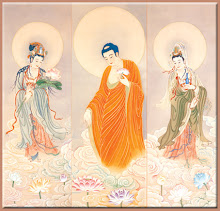
Administration of Justice.
Certain statutes regarding the administration of justice, were set up by the Buddha for the benefit of bhikkhus, in order to facilitate the dispensation of moral justice according to sound judgment, whenever the occasion arose.
By this act the Buddha ensured that the spirit of moral justice which enables us to interpret laws correctly, unlike the imperfect expression of certain aspects of our present day legal administration. At the time of the Buddha and even later, there were kings who took advantage of, and made use of these laws to supplement their own.
The judicial procedure adopted by the Buddha is clearly illustrated in the case of the Arahant Theri Kumara Kassapa's mother, who unaware of her pregnant condition,with her husband's consent left her home and entered the Bhikkhuni order. Later, finding her in an advanced state of pregnancy, the bhikkhuni was charged with a serious allegation of misconduct and summoned before a religious court of appeal.
The Buddha ordered Upali Thera, foremost among His Arahant disciples in knowledge of Vinaya matters, (and thus equal to that of the Chief Justice of today), to preside, try the innocent victim and to deliver judgment on her.
The audience consisted of bhikkhus, bhikkhunis and laymen, including the laywoman Visakha. She screened the victim from the presence of the Buddha and the rest. After careful examination and intimate questioning declared that she was quite innocent. The Arahant Upali on hearing the evidence absolved the bhikkhuni of any transgression.
Meditation
In the Buddha's Teaching the highest emphasis is laid on the law of cause and effect, or the conditionality of all mundane phenomena. Greed, hatred and delusion are the chief causes that lead to unsatisfactoriness in the world. If one seeks to escape from this state of dissatisfaction one should try to get rid of the underlying craving and anger or hatred due to ignorance of the true nature of things.
War is diametrically opposed to peace. Conflict is due to the various malignant motives stagnating in the minds of men. 'The control of such thoughts as greed, jealousy, hate and so on will certainly lead to peace. Permanent peace will only come when one has completely eradicated these mental defilements.
Wars will cease and peaceful dialogue between individuals will lead to a world of peaceful and harmonious living. Petty squabbles arose between the farmers on both sides of the river Rohini which served as the boundary between the Sakyan and the Koliyan kingdoms as each side tried to divert as much water as possible to their fields. Finally these led to a major confrontation of the two armies. The Buddha arriving on the scene exhorts them on the calamitous results of war and the advantage of arriving at a peaceful settlement. Thus war is averted and peace restored. It should be mentioned that the Buddha has been the only religious teacher to have visited a battlefront in person and acted as a true mediator in averting war.
The Buddha was born as a prince under a tree, gained supreme enlightenment under a tree and wandered about India for 45 years giving his teaching to the world, and finally passed away at the age of eighty at Kusinara under a tree as a human being.



No comments:
Post a Comment